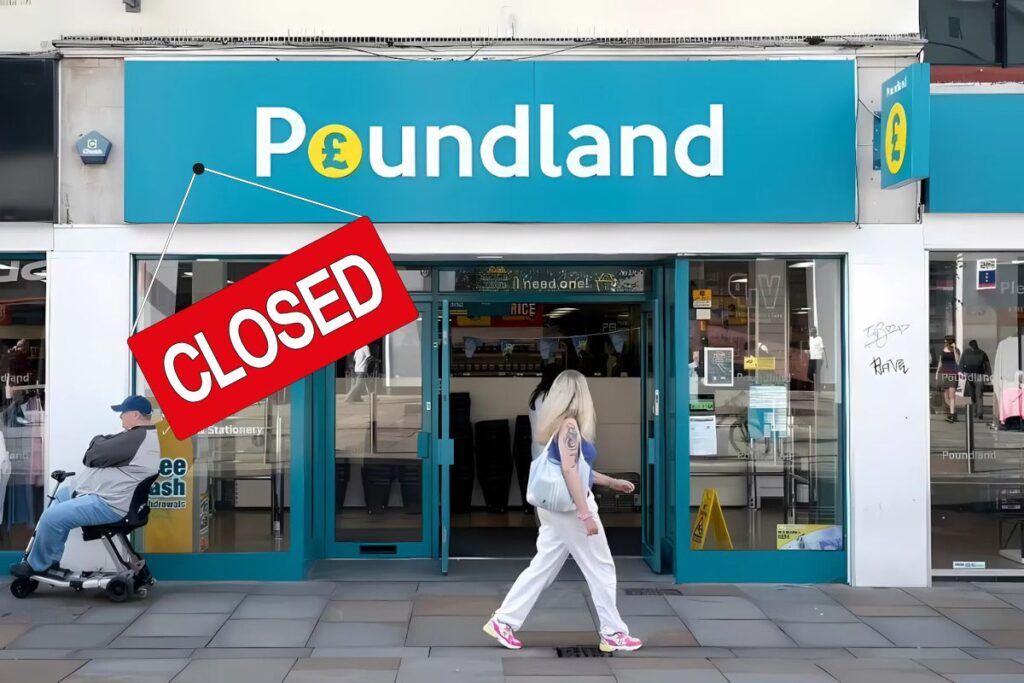So I was standing outside what used to be my local Poundland yesterday, staring at this massive “STORE CLOSING DOWN” sign blowing in the wind. Proper gutting, that is. This place is one where I have spent years. Odd things, birthday wrapping paper, cleaning supplies and more random kitchen gadgets that I never knew I needed. All gone.
Betty my nan would be turning over in her grave. She loved Poundland. “You can get anything in there for a pound, love,” she’d say. Course, that was back when things actually cost a pound. Now you’re lucky if you get change from a fiver.
But still. The loss of my local branch affected me far more than I had realised. That begs the question of what on earth is happening to all these Poundland stores closing down across the land.
The Numbers Don’t Look Pretty
Well, it appears I am not alone in suffering the loss of a local Poundland. As part of its restructuring plan, the company said it would close 68 stores, including 37 locations in August 2025 alone. That’s a lot of empty shops on already dying high streets.
Ten sites shut down on August 10, another 15 closed on August 17, and 12 more called it quits on August 24. Like dominoes falling, really. With each closure, another feeling of the next one being a matter of time.
My mate Dave works in retail and says these things always go in batches. One store goes down; traffic diminishes for the others nearby. It’s a right mess,” he told me over a pint last week.
It all began when Poundland was sold by Pepco Group to investment firm Gordon Brothers in June. New hands, new orders, fewer stores A tale as old as time in British retail.
Why It’s All Going Wrong
The problem is, Poundland used to be great because everything cost a pound. Simple concept. It was like you could go in with a tenner and come out with ten things. Kids could buy things with their pocket money.
Then prices started creeping up. Two pounds, three pounds, even five pounds for things that were once on pound shop items. Lost that magic, didn’t it? Still called Poundland, but half the stuff costs more than you’d pay in Tesco.
My daughter went in with her birthday money last month. Emily is her name. Twelve pounds from her grandparents. Came out with three things. Think it’s not very poundy now, Dad? she said. Out of the mouths of babes.
Online shopping hasn’t helped either. Quicker to order cheap phone chargers off Amazon than trek to Poundland. These days most people opt for convenience over price.
The Human Cost
Every time one of these stores shuts, real people lose their jobs. The woman who worked at my local branch, Sharon, had been there eight years. Knew everyone’s names, remembered what you usually bought. Proper old-school customer service.
“Don’t know what I’m going to do now,” she told me during the closing down sale. “Jobs like this don’t grow on trees around here.”
She’s right too. Our high street’s already got more empty shops than occupied ones. Another closure just adds to the problem.
The town centre feels like a ghost town some days. Poundland was one of the few places still bringing people in. Now that’s gone, what’s left? A couple of charity shops, a post office, and a Costa that’s always empty.
What This Means for Communities
Losing your local Poundland might not sound like a big deal, but it hits communities hard. Especially places where people don’t have cars or can’t easily get to big shopping centres.
My elderly neighbour Mrs Patterson relied on that store. Walking distance from her house, affordable prices, and everything she needed for daily life. Now she’s got to get the bus into town or ask family to help with shopping.
“I don’t understand why they’re closing,” she said to me over the garden fence. “It was always busy when I went in.”
That’s the thing, though. Busy doesn’t always mean profitable. High rents, rising costs, and competition from online. All adds up to stores that can’t make ends meet.
The Death of the High Street
Poundland stores closing is just another nail in the coffin for British high streets. Used to be you could get everything you needed within walking distance. Butcher, baker, newsagent, general store. All gone now.
My dad remembers when our high street had 30 different shops. Now it’s down to maybe 10, and half of those are struggling. Progress, they call it. Doesn’t feel much like progress when you’re driving 20 minutes to buy a birthday card.
Shopping centres killed off some high street shops. Then online shopping killed off the shopping centres. Now even the discount stores can’t survive. What’s next? Just Amazon warehouses and nothing else?
Also read: Farmfoods Knightswood Closure
Where People Actually Shop Now
Let’s be honest about why poundland stores closing isn’t surprising anymore. Shopping habits have changed completely in the last few years.
My sister does her weekly shop online. Gets it delivered every Tuesday like clockwork. Rarely sets foot in physical shops except for emergencies.
Young people barely know what high streets are for. They buy everything on their phones. Clothes, food, household stuff, the lot. Why would they trek to Poundland when they can get the same stuff delivered?
Even my mum, who’s 67 and swore she’d never shop online, now gets her groceries from Tesco Direct. “It’s just easier, love. No queues, no carrying heavy bags.”
Hard to argue with that logic, really.
The Bigger Picture
This restructuring puts thousands of jobs at risk across the country. Not just shop floor staff but also warehouse workers, delivery drivers, and head office people. Ripple effects everywhere.
The company says it’s trying to return to growth by focusing on profitable stores. Business sense, I suppose. But it doesn’t help if your local store is one of the ones getting axed.
These closures come amid widespread store closures throughout the UK, with multiple high-profile brands leaving the high street permanently. Poundland’s just the latest casualty in retail’s ongoing crisis.
My Take on It All
Look, I’m not saying Poundland was perfect. Sometimes the quality was dodgy, and the queues could be mental. But it served a purpose. Cheap stuff when you needed it, no fuss.
Now that’s disappearing, and I’m not sure what replaces it. Online shopping’s all well and good if you can wait for delivery. Not much help when you need something right now.
The social aspect matters too. Bumping into neighbours, having a chat with the staff, and feeling part of your community. Can’t get that from clicking “add to basket”.
What Happens Next
Nobody knows for sure what’ll happen to all these empty Poundland units. Some might get taken over by other retailers. Most will probably stay empty, adding to the ghost town effect.
The successful stores will keep going, presumably. The ones in busy shopping centres or areas with good footfall. But smaller towns and suburban locations? Looks like they’re stuffed.
My local unit’s already got estate agent boards up: “Prime retail space available.” Good luck with that. If Poundland couldn’t make it work, who can?
Final Thoughts
Watching poundland stores closing feels like watching the end of an era. These places weren’t glamorous, but they were reliable. A safety net for people on tight budgets, a convenient stop for everyday essentials.
Now they’re joining Woolworths, BHS, and countless other retailers in the graveyard of British high streets. Progress marches on, I suppose. Doesn’t mean I have to like it though.
Next time you pass your local Poundland, maybe pop in and buy something. Not because you need it, but because these places need our support. Once they’re gone, they’re gone for good.
And that’ll be a real shame for communities up and down the country.

